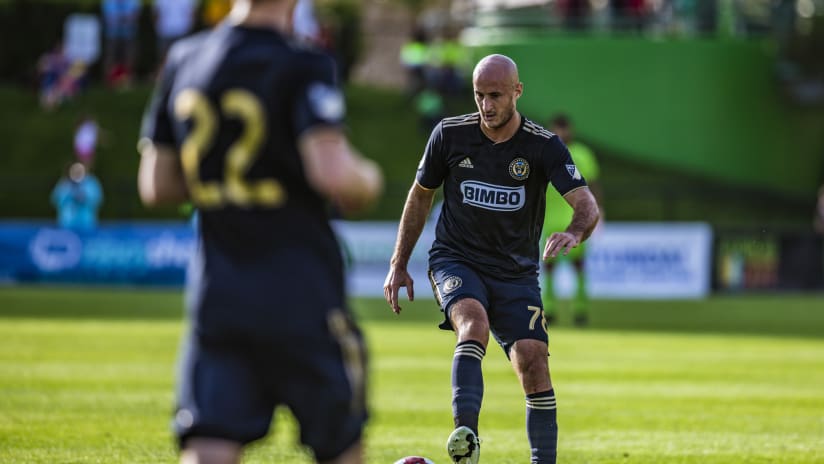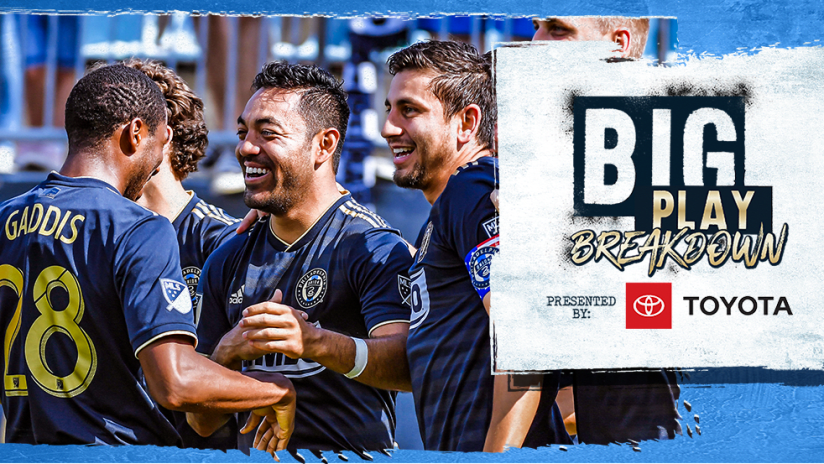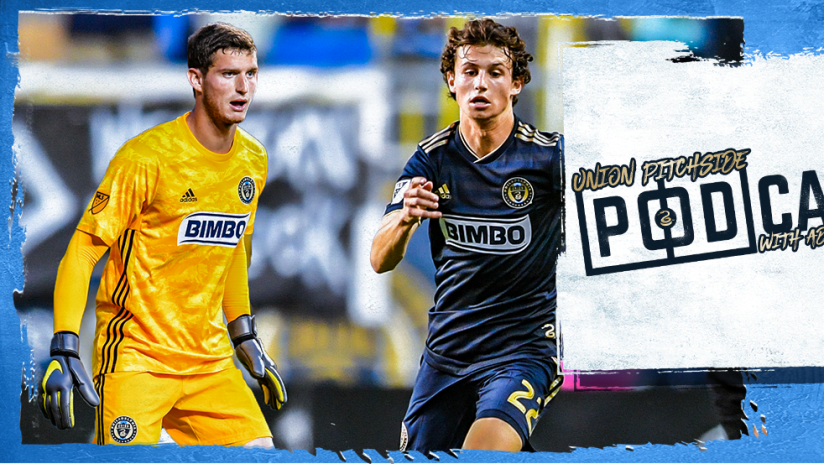2-0. Seattle Sounders had just pummeled the nascent Philadelphia Union franchise. The only thing of note on the visitors’ stat sheet was a first half red card to rookie Toni Stahl.
A skinny Frenchman, moving with the mechanical, caffeinated running motion of a robot in beta testing with extra batteries installed, created Philly’s best chance of the match: Spinning to create space in the box before losing his footing and tumbling, a living metaphor for the Union’s performance, to the artificial turf.
Ninety minutes into their existence and Philadelphia’s new Major League Soccer franchise had exactly zero names on its list of all-time leading goalscorers. Their first home match -- in front of over 30,000 fans at Lincoln Financial Field against storied DC United -- loomed on the horizon. Yet it was beginning to look like the hallmarks of a good team were in desperately short supply: “The two preseason deficiencies, discipline and goal scoring, continue to be problem areas,” local writer Ryan Pine worried. “Here’s hoping on April 10th, against I-95 rivals D.C. United, we begin and end with the same amount of players.”
The Union nabbed Sebastien Le Toux from Seattle in the expansion draft (an odd conference call in which existing clubs protect some players and allow others to be snatched away by a new franchise just before it joins the league), but few expected him to play a significant role with veteran striker Alejandro Moreno and number one overall SuperDraft pick Danny Mwanga on the roster.
The club's stadium in Chester, PA, just south of Philadelphia, was still under construction on April 10, so fans packed into Lincoln Financial Field in South Philly, home of the NFL’s Philadelphia Eagles, to see the home debut of their new MLS franchise.
“The first game at the Linc was crazy because you go in this big stadium and you go, 'How are we going to fill this big stadium?'” explains Le Toux, seemingly still amazed, eight years later, at how many people showed up. “And you go in and: Joe Biden. And I knew very little. People go, ‘You shook Joe Biden's hand!’ And I didn't know what that was about.”
The building was buzzing long before the opening whistle. “Everybody was so ready to be in love,” recalls Ed Farnsworth, soccer historian and former managing editor of The Philly Soccer Page (where, full disclosure, I used to write). “Everybody was so ready to be with the team and the players, and those beautiful moments when it all comes together.”
In the fourth minute, the Union scampered around DC United’s penalty area. The ball popped out to the right corner and found its way to Roger Torres, a smurf-sized Colombian midfielder with a sublime left foot. His arrow made an arc toward the six-yard box, and Sebastien Le Toux, moving somehow both stiffly and athletically, charged in behind a defender and met the cross with his head, lodging it firmly in the net behind DC goalie Troy Perkins. Beers flew in the air, plastic cups spinning out foam. Arms wild and flailing. Screams. Joy.
Thirty-six minutes later, Le Toux scored again, this one the type of play that now leaps instantly to mind when any long-time fan hears his name. Moreno collected the ball on the left, five yards inside the Union’s own half, holding off an aggressive defender with his wide, heavy frame. On the far side of the pitch, as if hearing a starting gun fired only for him, Le Toux took off. Moreno spun and lashed a long pass, zipping it over the turf into the space in front of his streaking teammate. With a defender closing behind him, Le Toux unleashed an early shot from outside the box -- a daisy-cutter, low and powerful -- that nestled in Perkins’ goal, leaving the goalie’s expression alternating between stunned surprise and professional appreciation.
“We were all like, 'We are winning! This is awesome!'” Farnsworth remembers. “And then DC claws back two goals, including one that shouldn't have been allowed.”
The dubious one came with the Union up 2-1 in the second half. Philly’s goalie, Chris Seitz, was preparing to punt the ball when DC striker Jaime Moreno made a move to block the kick before pulling away at the last moment. Seitz panicked and dropped the ball, and Moreno simply rounded him, slotting it into the empty net and tying the match, 2-2.
Organized soccer was off-limits until you were eight years old in the town of 400 people outside Rennes, France, where Sebastien Le Toux grew up. But there was no such restriction for the dance program his mother ran, so when she took his sister each Wednesday, young Seba had to come along too.
“It was painful because I just wanted to go play soccer with my other friends, but she'd say, ‘No, you go to the class,’” Le Toux recounts. “We did a show. I was so bad, I didn't even make it through the end of the show, I was crying.
“So next year she put me in soccer and it was much more fun.”
Soccer was everything to Le Toux growing up. He aced a tryout to join the soccer-focused academy at Rennes, requiring a 45 minute trip into town. “I was the first to leave the house and the last to come back every day,” he says, “I did that for four years.”
The dedication paid off when the coach of the top under-15s team -- the “A” team -- invited the fast, skinny kid to come play for him. But the first match didn’t go so well.
“He came back the next week and said, ‘Listen, what I'm doing right now is unusual. I believe in you. I'm giving you a stick and you need to take it,’” Le Toux says, perhaps revealing the roots of his high-effort approach.
“And the next game, against a big team, I came off the bench and we won the game. I did well. And from then on, I kept it up.”
An agent in France spent hours on the phone. He was rounding up players who were out of contract, extolling the potential benefits of a trip to Dallas, Texas in the United States.
“But you have to pay for everything,” Sebastien Le Toux shakes his head. “Are you interested?”
At the time, Le Toux had been months without a team. Lower division teams nibbled, but nothing felt like a good fit. The dream of becoming one of the guys he revered as a child, a professional soccer player, was slipping away, silent and dark, forever.
He joined the trip to the States. “I didn’t know what to expect. I went online to check: What is MLS?”
The quick, hard-working Frenchman piqued FC Dallas’ interest. Four months later, they asked him to return for an open tryout. “Like 300 people, and I didn't know what it was,” Le Toux says, “I was like, 'Damn, so many people!'”
He stood out once more, and stayed with Dallas during the preseason. “They wanted to offer me a contract,” he remembers. “And it was so low that I was like, 'I make more money with my unemployment right now!’”
But he enjoyed life in America. “I liked that I could understand nothing,” Le Toux shrugs. “It was good for me. I discovered how to have fun playing the game I love, as much as when I was a 10 year old in my backyard with my friends.”
He made a trip to Seattle and caught on with at the USL’s Seattle Sounders. It was a strange life for someone coming from a soccer-mad country. And since he could understand little English at the time, Le Toux could never tell when he was dealing with the quirkiness of American soccer or simply not in on a joke.
“We play a game in Portland one night, and the next day we have a home game at 4pm. And I was like... seriously?” he seems as though he still can’t believe it, and who can blame him. “We just played 90 minutes on the turf in Portland, and it's 10pm. So we take the bus for four hours, get home at 2am, and the next day we play against Vancouver. That's nuts.”
Yet, it was a perfect fit for the guy that simply wanted to be on a soccer pitch all the time. Le Toux started to pick up some English, bonding with teammates on the wild road trips that took them to Charlotte, Atlanta, Miami, and Puerto Rico back to back.
“We won everything,” Le Toux recalls with justifiable pride. “I finished MVP of the league. We won the league, we won the playoff. I won top scorer, which had never happened because I had been a right back!”
When Seattle Sounders began planting the seeds for life as a Major League Soccer franchise, the workhorse French striker was the first player they signed. No longer paying for his own tryouts, Sebastien Le Toux was headed for MLS.
“When you look at something, you know what’s wrong and what’s right,” Le Toux tells me. “For 80% of the people, it was like, ‘What the hell? We don't understand’”
There were rumbles before it happened, and, of course, the odd tryout with Bolton Wanderers of the English Premier League. Le Toux told local reporter Chris DeVito he was “honored” by the interest from Bolton, but Philadelphia was special to him, and he wanted to stay. “It had gotten to the point where I said to them, to Nick [Sakiewicz, former Union CEO], to Peter [Nowak, former Union head coach], to everyone, ‘Just give me a contract and I will sign it,’” Le Toux told DeVito. “I wanted to stay in Philly. I didn’t care about the money.”
“I’m sorry for the guy who already bought my jersey,” he lamented at the time. “Maybe he can get the refund.”
During the Union’s second season in MLS, Sebastien Le Toux had emerged, indisputably, as the club’s icon, an All-Star who had just scored the franchise’s first post-season goal in an opening-round playoff loss to Houston Dynamo. He was, to many, the foundation upon which the future would be built.
But not to everyone. In January 2012, after collecting 25 goals and 20 assists over two seasons, Le Toux was shipped to Vancouver Whitecaps for allocation money, part of a surprising roster overhaul that marked the beginning of the end of Peter Nowak’s time with the club.
The Frenchman spent part of a frustrating season in Vancouver, and, after a midseason trade, finished the year in New York with the Red Bulls, accumulating only five goals and two assists in total. With Nowak gone, the Union quickly moved to re-acquire Le Toux before the 2013 season, and he promptly bagged 15 goals and added 19 assists over the next two seasons, alternating between winger and striker roles.
In 2014, the team’s poor regular season form led the Union to dismiss John Hackworth, the former assistant coach who had succeeded Peter Nowak as manager. Jim Curtin took the reins, and a run to the US Open Cup final followed. An exceptionally talented Seattle Sounders team, led by American legend Clint Dempsey and the tricky, intelligent Obafemi Martins, was coming to Philadelphia to challenge for the Cup. Deep in extra time, Dempsey came off the bench and scored the winner, silencing the Philly faithful.
Even now, Le Toux’s face drops when talking about the Open Cup. “We hit the post at the end,” he says flatly. “But Seattle had a great team, and had a great player on the bench, and that made the difference.”
2015. Another Open Cup final. Again in Philadelphia. The opponent? Sporting Kansas City. “I remember we felt like it was unfinished business,” Le Toux says. “And it's not too hard to win it, we just have to be really focused for five games. And the penalty kicks were heartbreaking.”
2016. The Union were pushing for a playoff spot. Le Toux had played in 21 games, but only started 13. “I think we were third or something like this, we had great team chemistry between the young and old, everybody was really all together,” he remembers.
“And they traded me again.”
He was angry. And he stayed that way for quite some time. “I think about it, I can be mad. But I prefer to be over it,” he says now. “When I really think about it, I wish I'd never left those two times. I wish from 2010 until now, I was here.”
Yet, the Frenchman refuses to let anything come between him and the club he loves. A cosmic transformation began in that April twilight of 2010, and Sebastien Le Toux became something more than human to fans that had waited so long to see the professional game return to one of the nation’s soccer hotbeds.
“There was a goal I remember,” Ed Farnsworth lights up with sudden excitement. “It was at PPL [the former name of Talen Energy Stadium].”
“A ball popped out between Le Toux and Mwanga, and Le Toux was running onto it and struck this curler. And Mwanga got out of the way, and it was just one of those…” he trails off, transported back, into the memory.
“That was my first goal at PPL, in front of me, that was, 'Holy crap, look at that strike! I remember grabbing my friend Kurt and just being like, 'Oh my god!'”
Every Union fan has a story -- if not ten -- exactly like this.
“I know I'm not the best player ever,” Le Toux concedes. “I'm not Messi, I'm not Cristiano Ronaldo, but I always learn from my experiences, my past. I was not always successful in my career, I had a low period, and it was hard.
“Especially here, in the city, I feel such a great connection,” He glances out the window of the coffee shop where we’ve met. “You have to work hard to get what you want. And that's what I am on the field. I want to run as hard as I can, I try to make the most out of the small chances. And the fans like that about me playing. When I miss goals or when I try to hustle to press the defense, I'm trying to make things happen.”
It is the 80th minute. Alejandro Moreno has been taken down with a clumsy challenge just in front of the DC United penalty box. Free kick. The score is still 2-2.
“Honest to god,” Farnsworth says, energy filling his voice. “That happened in front of where we were sitting. And I just remember being like, ‘Well that's a crappy wall, DC.’”
Le Toux is behind the ball, and, indeed, DC goalie Troy Perkins has set up a ragged bank of teammates to protect his goal. Four bright white uniforms, with one Union player in dark blue standing off the shoulder of the man on the far left, then another white shirt on the end. Perkins is crouched just off-center in the goalmouth, heels up, hands out. Ready to spring.
Today, Le Toux holds the records for most games played, most goals scored, and most assists in Union history, among many, many others.
“I’ve said it a million times in a million different ways, that Seba is the face of this franchise,” argues Union head coach Jim Curtin. “He’s a guy that, right from the start, knew what it meant to embody this city, embody the fans, and score goals. And that’s a pretty good combination, so people fell in love with Seba right from the start.”
He started in France and found his groove in Seattle, but now Sebastien Le Toux is all Philly.
“When I went to Seattle and people were calling my name because I was successful, my English wasn't so good but I'd hang out and take pictures and autographs and never leave because I'd feel bad if I had time to stay,” Le Toux tells me. “I'd hate to be like, 'Sorry, I'm too good for you’.”
“Especially the first year here, we lost a lot of games, and it was a difficult season,” he continues. “So to be able to swallow my ego and say I'll spend time with the fans and get some positive out of it, it was good therapy for me; to keep going and doing what I needed to do on the field. I know I give them some happiness by signing the autograph, but they give me back as much by saying, ‘Great game!’ or ‘It was fun to see you play!’ or ‘I like you!’”
“I'm not playing, but I will always be a fan of this team,” Le Toux, still close to playing shape, pushes his backwards cap down over his hair. “I want them to succeed. I want to be part of the first to win a championship here. Maybe not as a player, but a coach, front office, just try to make it successful.”
 |  |
|---|
The Union player in the wall slides backward, and the DC man on the end moves toward the other four, opening a lane to Perkins’ left. Le Toux approaches the ball carefully, but not apprehensively. He strikes a low, spinning shot into that hole in the wall and sprints off toward the sideline in ecstatic celebration. 3-2.
The Linc rocks and rolls; the fading sun gives the whole scene a Martian glow, as if an approaching apocalypse had been blissfully thwarted.
“The level above us is where the DC United support was sitting,” Farnsworth grins. “And we proceeded to be showered with beer. I remember all of us turning around and looking up, and laughing.
“How many times can you really point to a moment where a guy will never have to pay for a beer in this city again?”












